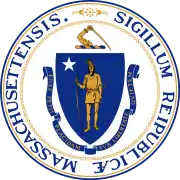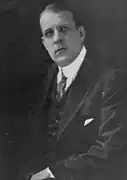| |||||||||||||||||
| |||||||||||||||||
| |||||||||||||||||
| Elections in Massachusetts |
|---|
 |
|
|
The 1926 United States Senate special election in Massachusetts was held on November 2, 1926.
Former Democratic Senator David I. Walsh defeated incumbent William Morgan Butler, a Republican who was appointed after the death of Republican Senator Henry Cabot Lodge.
Walsh returned to the U.S. Senate for a 2-year term. He had previously served in the Senate from 1919 to 1925.
Background
Senator Henry Cabot Lodge, whose sixth term was set to expire in 1929, died on November 9, 1924, after suffering a stroke. On November 13, 1924, Governor of Massachusetts Channing Cox appointed William M. Butler, the chair of the Republican National Committee, to fill the vacant seat until a successor could be duly elected. The special election for the remainder of Lodge's term was scheduled for November 2, 1926, concurrent with the next general election.
Republican primary
Candidates
- William M. Butler, incumbent Senator and chairman of the Republican National Committee
Declined
- Channing Cox, former Governor of Massachusetts
Campaign
Butler formally announced his anticipated campaign for the special election on April 22, 1926, at a rally at Boston Symphony Hall, where he was endorsed by Governor Alvan T. Fuller, Senator Irvine Lenroot of Wisconsin, and Assistant Secretary of War Hanford MacNider.[1] Most of the speakers connected Butler's campaign to the re-election prospects of President Calvin Coolidge, a close ally of Butler.[1]
At the Republican convention on September 24, Butler was unopposed for the nomination and received the unanimous support of the delegates.[2]
Results
Senator Butler was unopposed for the Republican nomination.
| Party | Candidate | Votes | % | |
|---|---|---|---|---|
| Republican | William Morgan Butler (incumbent) | 209,836 | 100.0% | |
| Write-in | All others | 18 | 0.0% | |
| Turnout | 209,854 | 100.0% | ||
Democratic primary
Candidates
- David I. Walsh, former Senator
Results
Walsh was unopposed for the Democratic nomination.
| Party | Candidate | Votes | % | |
|---|---|---|---|---|
| Democratic | David I. Walsh | 111,083 | 99.95% | |
| Write-in | All others | 58 | 0.05% | |
| Turnout | 111,141 | 100.0% | ||
General election
Candidates
- John J. Ballam, founding member of the Communist Party of America (Workers')
- William M. Butler, incumbent Senator (Republican)
- Washington Cook, Republican Executive Councillor and independent candidate for Senate in 1922 (Modification of Volstead Act)
- Alfred Baker Lewis, attorney, union organizer, and activist (Socialist)
- David I. Walsh, former U.S. Senator (Democratic)
Results
| Party | Candidate | Votes | % | ±% | |
|---|---|---|---|---|---|
| Democratic | David I. Walsh | 525,303 | 52.01% | ||
| Republican | William M. Butler (incumbent) | 469,989 | 46.54% | ||
| Communist | John J. Ballam | 5,167 | 0.51% | ||
| Modification of Volstead Act | Washington Cook | 4,766 | 0.47% | ||
| Socialist | Alfred Baker Lewis | 4,730 | 0.47% | ||
| Total votes | 1,009,955 | 100.0% | |||
References
- 1 2 "Republicans Indorse Butler's Candidacy". The Boston Globe. April 23, 1926. p. 1. Retrieved March 31, 2023.
- ↑ "Senator Butler Accepts His Renomination". The Boston Globe. September 25, 1926. p. 4. Retrieved March 31, 2023.
- ↑ Office of the Secretary of Commonwealth of Massachusetts (1926). Number of assessed polls, registered voters and persons who voted in each voting precinct in the Commonwealth of Massachusetts at the state, city and town elections. p. 123.
- ↑ Office of the Secretary of Commonwealth of Massachusetts (1926). Number of assessed polls, registered voters and persons who voted in each voting precinct in the Commonwealth of Massachusetts at the state, city and town elections. p. 123.
- ↑ Office of the Secretary of Commonwealth of Massachusetts (1926). Number of assessed polls, registered voters and persons who voted in each voting precinct in the Commonwealth of Massachusetts at the state, city and town elections. p. 175.

